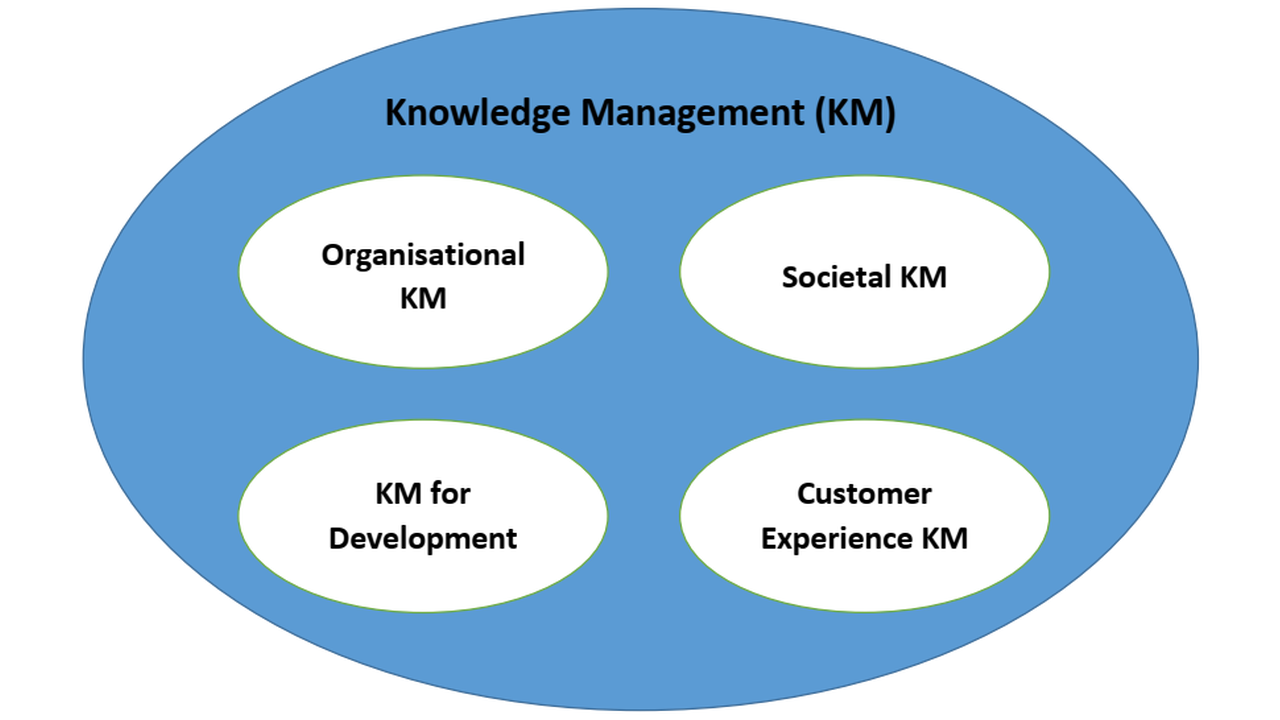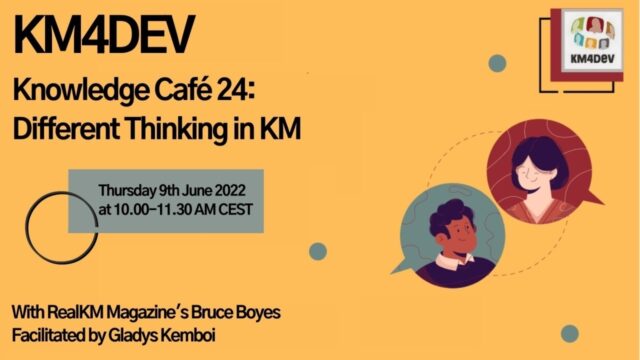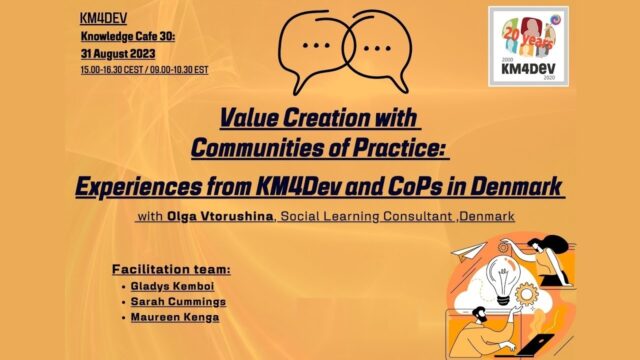
What are the potential knowledge management (KM) disciplines in an interdisciplinary approach to KM?
Prominent knowledge management (KM) researcher Alexander Serenko has recently published the findings of a structured literature review1 of scientometric research of the KM discipline for the 2012–2019 time period. This 2021 study updates his 2013 review of the KM discipline.
From the review findings, Serenko lists a series of implications for the KM discipline. The first of these is that:
Scholars should realize that the KM discipline may successfully exist as a cluster of divergent schools of thought under an overarching KM umbrella and that the notion of intradisciplinary cohesion and consistency should be abandoned. Hannabuss (1987) envisioned the interdisciplinary nature of the KM discipline, and it seems that his prediction has materialized: there is a general consensus that the field has progressed in an interdisciplinary direction. Interdisciplinary research leads to creativity, value, impact and high scientific output. Thus, as an interdisciplinary field of science, KM has great potential to contribute to the state of theory and practice, and the scientific KM community should fully embrace the notion of interdisciplinarity, a divergence of opinion and a multiplicity of co-existing paradigms.
While aimed at KM researchers, an evidence-based approach to KM means that this implication will also extend to KM practitioners (and indeed, another of the implications that Serenko identifies from his review is that “There is a need for knowledge brokers that may deliver the KM academic body of knowledge to practitioners.”).
So what are the potential knowledge management (KM) disciplines in an interdisciplinary approach to KM? And what are the potential consequences of this? As a starting point for discussions, I suggest the following disciplines, which are also represented in the diagram above:
- Organisational KM
- KM for Development
- Societal KM
- Customer Experience KM.
Please add your thoughts and comments on these potential disciplines below. Although you may not have considered KM from an interdisciplinary perspective, there are actually significant manifestations of an interdisciplinary approach already evident in KM. One of the most notable examples is in regard to what are arguably two of the most important communities of practice in KM – SIKM Leaders and KM4Dev.
Organisational KM
This is what many people would commonly know as KM – the various KM activities carried out within an organisation, typically as part of a knowledge management system (KMS), and often under the leadership of a person with the title of Chief Knowledge Officer (CKO) or similar.
A key community of practice for organisational KM is SIKM Leaders (although SIKM discussions can be broader than this, which is consistent with an interdisciplinary approach).
ISO 30401:2018 Knowledge management systems – Requirements also relates directly to organisational KM, as does much of the available KM training.
KM for Development
This relates to KM in the context of international development and the Sustainable Development Goals (SDGs). While KM for development and organisational KM have some activities in common, there are also areas of difference, for example multiple knowledges and multi-stakeholder processes2,3 in KM for development.
Those working in KM for development will often have different role titles and descriptions to those working in organisational KM, and the skillsets are also somewhat different (indeed, my own background and skillset is more in KM for development and societal KM than in organisational KM).
A key community of practice for KM for development is KM4Dev (although KM4Dev discussions can be broader than this, which is consistent with an interdisciplinary approach).
ISO 30401:2018 Knowledge management systems – Requirements is arguably much less relevant to KM for development than it is to organisational KM, as is much of the available KM training.
Societal KM
This is described in the following newly published Henley Forum article by David Gurteen. It is also related to what has been proposed as “visions of knowledge systems for life on Earth” in a recent paper4, and linked to this, what I have suggested as the need for transformations towards “Common Good KM.”
Societal KM has an important political aspect, as does organisational KM. David Gurteen advises that “In talking about politics, I’m not only referring to the activities associated with the governance of a country; I include office or workplace politics though I use the term organizational politics … If you are going to work effectively in an organization, then you cannot avoid politics, you have to be political. It is through politics that you get things done.”
While some of us have ventured into the area of societal KM, it has yet to be substantially considered by the KM community.
Customer Experience KM
On the one hand, this is potentially a component of organisational KM, but on the other hand, potentially a distinct KM discipline because of the importance of customer interactions in everyday life. As Aprill Allen advises in a recent article, “Customer experience is the 2021 buzzword on every leader’s lips. How your customers perceive your brand holistically matters more in the current landscape than ever before.”
An important aspect of the current landscape is COVID-19, which as Harvard senior fellow Camilla Cavendish writes in the Financial Times, has seen many organisations provide poor customer service (something that I recently experienced myself, with devastating consequences).
See also: Implications for the knowledge management discipline from a review of scientometric research which provides Serenko’s full list of implications with some further commentary.
References:
- Serenko, A. (2021). A structured literature review of scientometric research of the knowledge management discipline: a 2021 update. Journal of Knowledge Management, 25(8), 1889-1925. ↩
- Cummings, S., Regeer, B. J., Ho, W. W., & Zweekhorst, M. B. (2013). Proposing a fifth generation of knowledge management for development: investigating convergence between knowledge management for development and transdisciplinary research. Knowledge Management for Development Journal, 9(2), 10-36. ↩
- Cummings, S., Kiwanuka, S., Gillman, H., & Regeer, B. (2018). The future of knowledge brokering, perspectives from a generational framework of knowledge management for international development. Information Development, https://doi.org/10.1177/0266666918800174 ↩
- Fazey, I., Schäpke, N., Caniglia, G., Hodgson, A., Kendrick, I., Lyon, C., … & Saha, P. (2020). Transforming knowledge systems for life on Earth: Visions of future systems and how to get there. Energy research & social science, 70, 101724. ↩
Also published on Medium.







Thanks Bruce,
I have always considered KM an interconnected/interdependent discipline. This is where it adds most value for all stakeholders. As you (and David Gurteen) highlight, the conversations across different areas is what triggers creativity, which drives new knowledge co-creation and innovation. The connections and flow required to generate value from this is where knowledge managers do their most important work- they facilitate conversations & interactions in a way that stimulate trust, which opens up the relationships to increase the rich sharing.
So to supplement your four disciplines, I would suggest we acknowledge the importance of the environment in which interactions between them occurs (and why). I discuss this in more detail in both KNOWledge SUCCESSion and Becoming Adaptable.
There really are only 2 disciplines:
Organizational and personal.
Everything else are variations on the same theme. They are focused on outcomes or value generation.
This whole exercise is KM practitioners talking with themselves. Our clients, customers and sponsors in general don’t care what “KM” is, as long as things are better as a result.
If we are proceeding anyway, then some necessary adds:
KM for Governing
KM for Public Sector
KM for Defense
KM for Exploration
KM for Discovery
KM for Project Management
KM for Entrepreneurship
KM for Traditional Education
KM for Learning